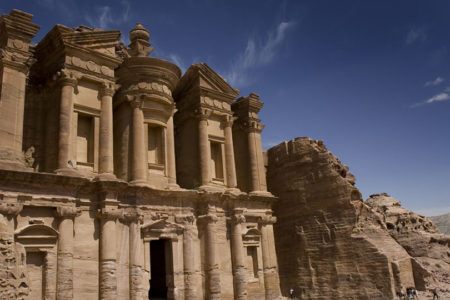The Faith of Moses Hebrews 11:23–29
Moses was a gifted leader whom God used to bring about His plan for Israel and the world. He was blessed with good looks, intelligence, opportunities, eloquence, and leadership ability (Ex. 2:2; Acts 7:20, 22). The Bible describes him as “the man of God” and “the servant of the Lᴏʀᴅ” (Dt. 33:1; 34:5). In fact, his relationship with God was so intimate that “the Lᴏʀᴅ spoke to Moses face to face, as a man speaks to his friend” (Ex. 33:11).
His Parents’ Faith
“By faith Moses, when he was born, was hidden three months by his parents, because they saw he was a beautiful child; and they were not afraid of the king’s command” (Heb. 11:23).
Moses’ parents, Amram and Jochebed from the tribe of Levi, were people of faith (Num. 26:59). Moses was born in Egypt in an era when the midwives were under orders to kill all Jewish newborn males (Ex. 1:15–17).
Moses is described as a “beautiful [i.e., good] child” (Heb. 11:23; cf. Ex. 2:2; Acts 7:20). Perhaps his parents were aware that Israel’s 400-year captivity in Egypt (Gen. 15:13–14) was soon to end and that their son might play a role in Israel’s deliverance. Whatever the reason, they demonstrated faith in God and hid Moses for three months.
When Jochebed could no longer hide him, by faith she made an ark of bulrushes, daubed it with asphalt and pitch, and laid Moses in it by the river-bank. Pharaoh’s daughter (possibly Hatshepsut, the young daughter of Thothmes I) discovered the infant and asked Moses’ sister, Miriam, waiting nearby, to summon a Hebrew nurse.
In God’s sovereignty, Jochebed became his nurse. Pharaoh’s daughter gave Moses to his mother and even paid her wages until he became Pharaoh’s daughter’s adopted son (Ex. 2:1–10; Acts 7:21).
Thus Jochebed had a number of years to implant in Moses a sense of his Jewish identity. This is a beautiful example of how God honored the faith of a humble, God-fearing couple. He answered their prayer, spared Moses’ life, and fulfilled His purpose for him.
His Personal Faith
Moses’ life is divided into three major sections of 40 years each. The first 40 years were spent in Pharaoh’s court; the second 40, in the desert of Midian; and the last 40, in the desert of Sinai.
History provides some insight concerning the royal court at that time:
Scholars tell us that this Pharaoh had a son, who because he was physically and mentally handicapped, was considered incapable of assuming the royal prerogatives to which he had been born. When he ascended the throne as Thothmes II, his sister Hatshepsut became regent and actually ruled the country. Thothmes II eventually died without a legitimate heir, but because both his father and sister had foreseen this lack of a successor, they probably had determined long beforehand that Moses would be the eventual heir. So from earliest years Moses had been educated with this in mind, as Stephen declares: “Moses was learned in all the wisdom of the Egyptians, and was mighty in words and deeds” (Acts 7:22).
When her brother died, it appears that Hatshepsut retained supreme authority as regent in Egypt and indicated her intention of placing Moses, her adopted son, on the throne as her successor. To legitimize this, she had planned to marry Moses to her elder daughter, Nepherus. Moses, however, apparently both refused the throne and the bride, and thus sacrificed his position in the kingdom and the honor and the wealth that went with it.1
A number of steps were involved in Moses’ journey of faith.
Rejection. First, Moses rejected his royal position: “By faith Moses, when he became of age [40 years old, Acts 7:23], refused to be called the son of Pharaoh’s daughter” (Heb. 11:24). This decision was an act of faith. He chose to leave his royal privilege in Egypt and identify with the Israelite slaves (Ex. 1:8–14).
Reevaluation. Moses chose “rather to suffer affliction with the people of God” (Heb. 11:25). He viewed Israel not as slaves, but as God’s people. He knew the Lord had called him to be part of his people’s divine destiny and was willing to suffer affliction with them.
Refusal. Moses refused to “enjoy the passing pleasures of sin” (v. 25). His royal position offered him all the enjoyment and experiences of prestige and power that most men want. However, Moses shunned them all. For him to remain in Egypt’s court would have been the sin of disobedience because he knew God was calling him to a divine mission among the Israelites.
As the text says, sin is a “passing pleasure”; it provides only momentary satisfaction that is deceptive and fleeting. The patriarch Joseph had a royal position in Egypt for many years and remained a godly man, serving God in total commitment. The same could be said of the prophet Daniel, who enjoyed royal privileges in Babylon.
Reflection. Moses was well aware of the reproach he would suffer. He did not jump quickly to leave the royal court but carefully reflected on what it would cost him before making his life-changing decision. He was willing to suffer “reproach” (v. 26)—to be derided, laughed at, and persecuted for his choice.
Scripture puts Moses’ decision into a Christian context: “esteeming [considering] the reproach of Christ greater riches than the treasures in Egypt” (v. 26). The word Christ is the same as Messiah and means “Anointed One.” Some believe the phrase means Moses experienced the same type of rejection and persecution as Christ, but such was not the case. Others believe it means Christ was with Israel and Moses during their suffering and that He suffered along with them (cf. Isa. 63:9).
Still others believe the phrase refers to the reproach Moses bore because of his relationship to the promised Messiah and, by faith, anticipated it would come.
What we do know is that God revealed much to Moses about a coming prophet who would later be identified as Jesus Christ. (See Deuteronomy 18:15–19 and John 5:46.) Thus he probably knew more about Christ than Abraham before him (Jn. 8:56). It is not unreasonable to believe that Moses, being a deliverer of God’s people, suffered the same type of rejection and reproach from his people as would Jesus, the coming Messiah.
Moses considered what he had in the Messiah (Christ) to be “greater riches than the treasures in Egypt” (Heb. 11:26). Wrote Bible expositor Homer Kent: “The wealth and opulence of the Eighteenth Dynasty is well known from the remains of tombs and temples. The fabulous treasures discovered in the tomb of Tutankhamen, a later pharaoh in this dynasty, speak eloquently of the luxuries available to royalty in Egypt.”2 Moses gave up great wealth for the greater wealth he had in Christ.
Reward. Moses knew he would be rewarded for his faith, and “he looked to the reward” (v. 26). He did not look for earthly wealth and opulence but, rather, for spiritual wealth that was eternal and would be granted in the life to come.
His Public Faith
Moses exhibited persevering faith: “By faith he forsook [abandoned] Egypt, not fearing the wrath of the king” (v. 27). Moses left Egypt twice: when he fled to Midian and when he led Israel out of Egypt. Many commentators believe Hebrews 11:27 refers to Moses fleeing Midian because the word he seems to fit that occasion better. But the verse states that Moses left not fearing the king’s wrath. When Moses fled to Midian, he did so in fear, not in faith (Ex. 2:14–15).
In the Exodus, Moses “forsook” or permanently departed from Egypt, totally renouncing it. This was not the case in going to Midian. So it seems best to interpret the passage as referring to when Moses left in the Exodus.
Moses departed Egypt strong in faith because “he endured [held fast and persevered] as seeing Him who is invisible” (Heb. 11:27). With no means to defend Israel against Pharaoh, Moses persevered, keeping his eyes fixed on the invisible God who enabled him to stand boldly against the exceedingly great power of Pharaoh, who was determined to destroy him and keep the Israelites in slavery.
Moses exhibited faith by instituting the Passover: “By faith he kept the Passover and the sprinkling of blood, lest he who destroyed the firstborn should touch them” (v. 28). In obedience to God’s command, Moses instructed each Israelite household to kill a lamb and apply some of its blood to the lintels and doorposts of their houses to protect them from physical death. For God was to pass through Egypt, killing the firstborn of man and beast in each house not protected by the blood (Ex. 11:4; 12:12–13, 23, 27, 29). Moses’ faith in God’s provision of blood protection was great indeed because neither he nor Israel nor the world had ever seen such deliverance.
Moses exhibited faith in God’s protection: “By faith they passed through the Red Sea as by dry land, whereas the Egyptians, attempting to do so, were drowned” (Heb. 11:29).
The Red Sea crossing is recorded in Exodus 14. Pharaoh pursued Israel hoping to recapture his slaves. The Israelites, struck with terror, were trapped by the sea in front and Pharaoh’s army at the rear. Frightened and angry, they blamed Moses for their predicament. In a step of great faith, Moses declared, “Do not be afraid. Stand still, and see the salvation of the Lᴏʀᴅ….For the Egyptians whom you see today, you shall see again no more forever. The Lᴏʀᴅ will fight for you, and you shall hold your peace” (Ex. 14:13–14).
As the children of Israel walked into the sea, the waters parted; and they walked on dry land with the water walled up on both sides. The Egyptians tried to follow and drowned in the sea (vv. 27–28). God had promised to protect and deliver Israel, but both Moses and Israel had to step out in faith.
Moses stands as a giant when it comes to faith, character, and resolve to serve the Lord. The lessons we can learn from his faith should strengthen our faith as well.
ENDNOTES
- J. Dwight Pentecost and Kenneth M. Durham, Faith That Endures, rev. ed. (Grand Rapids, MI: Kregel, 2000), 188–189.
- Homer A. Kent, Jr., The Epistle to the Hebrews (Winona Lake, IN: BMH Books, 2002), 239.








Thank you for this insightful presentation about Moses’ faith. It is evident that Moses established a deep foundation of faith in his own heart and mind. Moses understood his own history. Moses most certainly felt God’s calling on his life. He chose to pay the price to accept this calling. Moses could have declined, could have lived a royal life in a palace. But he accepted the call. He earned the trust of God. Moses earned a place in the history of God’s Providence for Salvation.
Heart Touching. Deep Insights
It’s been a pleasure to read such words as God chose people to teach them about him and how to live holy
I have learnt alot out of this, have just realized that there were still many things I needed to know about Moses
All glory to our lord and saver Jesus christ we are very much bless with an inspiration message may God almight contiue to bless you
I enjoyed reading your article. Pls would want to study more..
All glory to jesus. we are so blessed